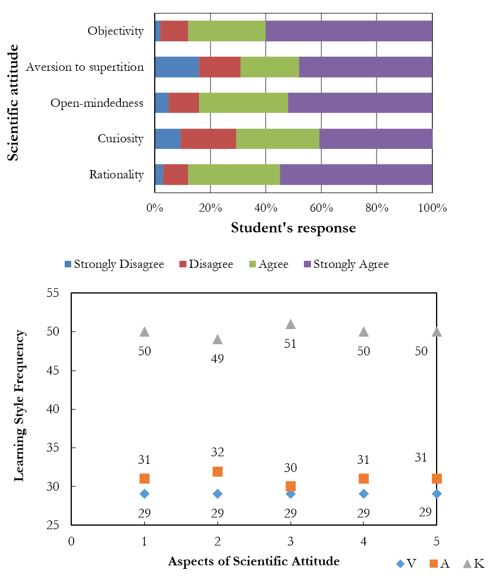
An Analysis of the Relationship between Students’ Scientific Attitude and Students’ Learning Style in Junior High School
Abstract
Full Text:
DOWNLOAD PDFReferences
Akhlaghi, N., Mirkazemi, H., Jafarzade, M., & Akhlaghi, N. (2018). Does learning style preferences influence academic performance among dental students in Isfahan, Iran? Journal of educational evaluation for health professions, 15(8), 1–6.
Ali Khan, S., Shah, A., Makhdoom, S., Mahmood, Z., & Zareen, R. (2012). Scientific attitude development at secondary school level: A comparison between methods of teaching. Language in India, 12(9), 439–454.
Ataha, U. C., & Ogumogu, A. E. (2013). An investigation of the scientific attitude among science students in senior secondary schools in edo south senatorial district, edo state. Journal of education and practice, 4(11), 12–17.
Coffield, F., Moseley, D., Hall, E., Ecclestone, K., & Ecclestone, K. (2004). Learning styles and pedagogy in post-16 learning: A Systematic and critical review.
Curry, L., & Adams, C. (1991). Patterns of learning style across selected medical specialties. Educational Psychology, 11(3), 37–41.
El-farargy, N. (2010). The views, attitudes and learning style preferences of higher national chemical engineering students. Education for Chemical Engineers, 5(4), 55–71.
Federico, P. (2000). learning styles and student attitudes toward various aspects of network-based instruction. Computers in human behavior, 16, 359–379.
Fraenkel, J. R., Wallen, N. E., & Hyun, H. H. (2013). How to design and evaluate research in education. New York: McGraw-Hill.
Gardner, P. L. (1975). Attitudes to science: A review. Studies in science education, 2, 37–41.
Gholami, S., & Bagheri, M. S. (2013). Relationship between VAK learning styles and problem-solving styles regarding gender and students’ fields of study. Journal of language teaching and research, 4(4), 700–706.
Gravetter, F. J., & Wallnau, L. B. (2009). Statistics for the behavioral sciences. california: Wadsworth Cengage Learning.
Istikomah, H., Hendratto, S., & Bambang, S. (2010). Penggunaan model pembelajaran group investigation untuk menumbuhkan sikap ilmiah siswa. Jurnal pendidikan fisika indonesia, 6(1).
Joy, S., & Kolb, D. A. (2009). Are there cultural differences in learning style?. International Journal of intercultural relations, 33, 69–85.
Kant, R., & Singh, M. D. (2015). Relationship between learning styles and scientific attitude of secondary school students and their achievement in science subject. Journal of educational sciences & psychology, 5(1), 01–10.
King, B. M., Rosopa, P. J., & Minium, E. W. (2011). Statistical reasoning in the behavioral sciences. new jersey: John Wiley & Sons, Inc.
Kolb, A. D. (1984). Experiential learning experience as the source of learning and development. New Jersey: Prentice Hall.
Krathwol, D. R., Bloom, B. S., & Masia, B. B. (1964). Taxonomy of educational objectives book 2 affective domain. New York: Longman Inc.
Kurniawan, D. A., Astalini, & Sari, D. K. (2019). An evaluation analysis of students’ attitude towards physics learning at senior high school. Jurnal penelitian dan evaluasi pendidikan, 23(1), 26–35.
Lacap, M. P. (2015). The scientific attitudes of students major in science in the new teacher education curriculum. Asia pacific journal of multidisciplinary research, 3(5), 7–15.
Laforgia, J. (1988). The affective domain related to science education and its evaluation. Science education, 72(4), 407–421.
Magulod, G. C. (2019). Learning styles, study habits and academic performance of Filipino university students in applied science courses: Implications for instruction. Journal of technology and science education, 9(2), 184–198.
Nugraha, I., & Eliyawati. (2019). The use of video laboratory report to develop presentation skills in science teacher education students. Journal of physics: conference series. 1157(2), 1-6.
Oloruntegbe, K., & Omoifo, C. (2005). Development and validation of an instrument of scientific attitude that is curriculum based. African journal of curriculum studies, 2(2), 147–153.
Ozden, B., Yenice, N., & An, N. (2014). An analysis of the secondary education students ’ scientific attitudes. International journal of contemporary educational research, 1(2), 86–97.
Pashler, H., McDaniel, M., Rohrer, D., & Bjork, R. (2009). Learning styles; Concepts and evidence. A Journal of the association for psychological science, 9(3), 105–119.
Penger, S., & Tekavcic, M. (2009). Testing dunn & dunn’s and honey & mumford’s learnins style theories: The case of the slovenian higher education system. Management, 14(2), 1–20.
Pitafi, A. I., & Farooq, M. (2012). Measurement of scientific attitude of secondary school students in pakistan. Academic research international, 2(2), 379–392.
Punia, V., & Bala, R. (2009). Scientific attitude amongst the Science and Non-science Pupil Teachers: A Comparative Analysis. SRDE’s Higher Education Journal, 1, 9-16.
Sanni, K. T., & Emeke, E. A. (2017). Direct and indirect effects of personality type and learning style preferences on students’ achievement in senior secondary school biology in osun state, nigeria. European journal of education studies, 3(11), 825–839.
Shaw, G., & Marlow, N. (1999). The role of student learning styles, gender, attitudes and perceptions on information and communication technology assisted learning. Computer & education, 33, 223–234.
Suryawati, E., & Osman, K. (2018). Contextual learning: Innovative approach towards the development of students’ scientific attitude and natural science performance. Eurasia Journal of mathematics, science and technology education, 14(1), 61–76.
Vaishnav, R. (2013). Learning style and academic achievement of secondary school students. Voice of research, 1(4), 1–4.
Weng, F., Ho, H. J., Yang, R. J., & Weng, C. H. (2019). The influence of learning style on learning attitude with multimedia teaching materials. Eurasia journal of mathematics, science and technology education, 15(1), 1–9.
White, J. (1994). Individual characteristics and social knowledge in ethical reasoning. Psychological reports, (75), 627-649.
Widowati, A., Nurohman, S., & Anjarsari, P. (2017). Developing science learning material with authentic inquiry learning approach to improve problem solving and scientific attitude. Jurnal pendidikan IPA Indonesia, 6(1), 32–40.
Zain, A. N. M., Samsudin, M. A., Rohandi, R., & Jusoh, A. (2010). Using the rasch model to measure students' attitudes toward science in" low performing" secondary schools in malaysia. International education studies, 3(2), 56-63.
DOI: https://doi.org/10.17509/jsl.v3i3.22873
Refbacks
- There are currently no refbacks.
Copyright (c) 2020 Ikmanda Nugraha, Nabilah Kinanti Putri, Hayat Sholihin

This work is licensed under a Creative Commons Attribution-ShareAlike 4.0 International License.


Jl. Dr. Setiabudhi 229 Bandung 40154, West Java, Indonesia










